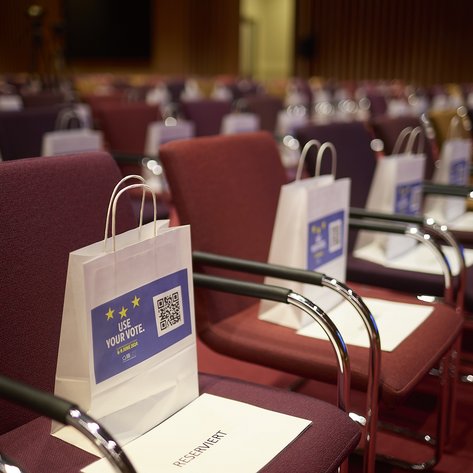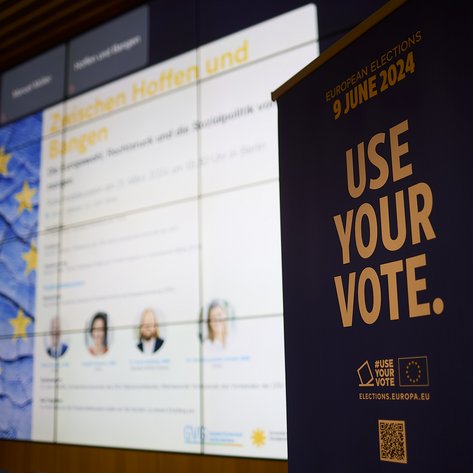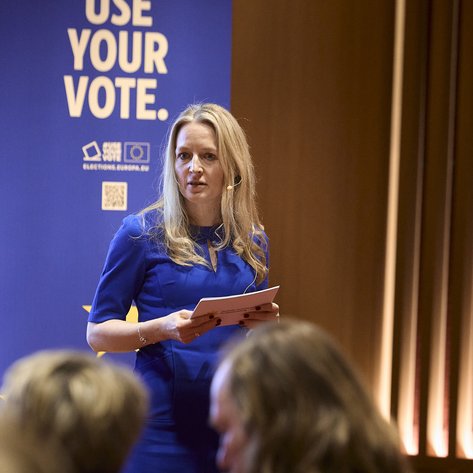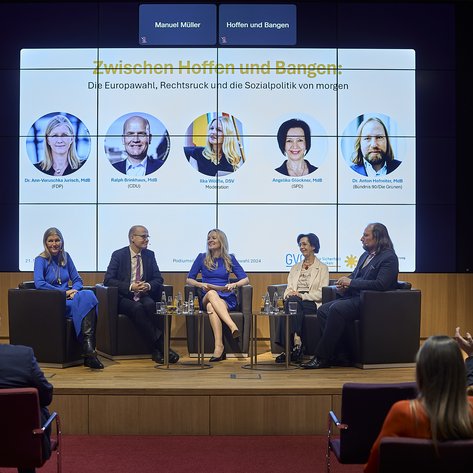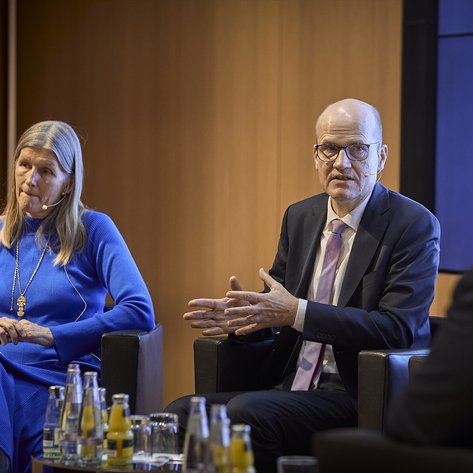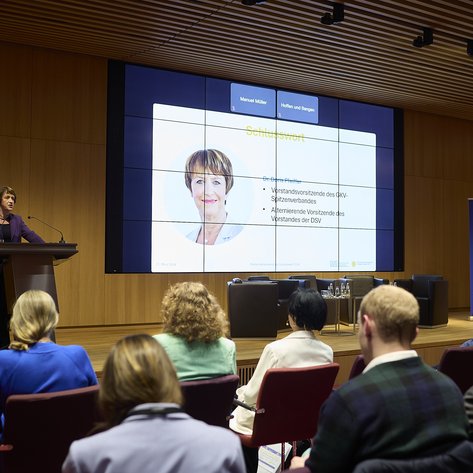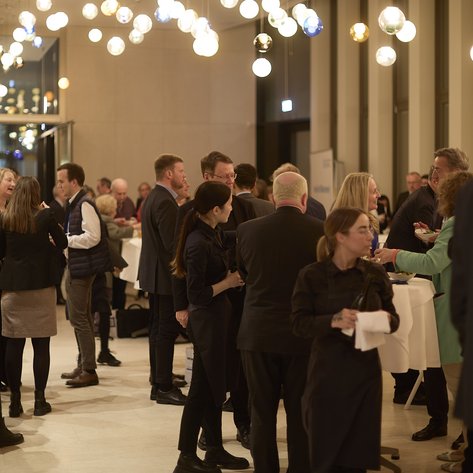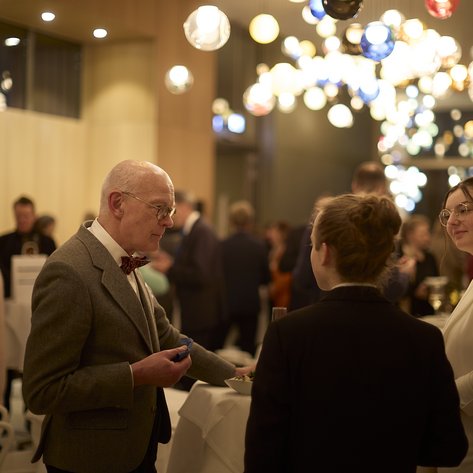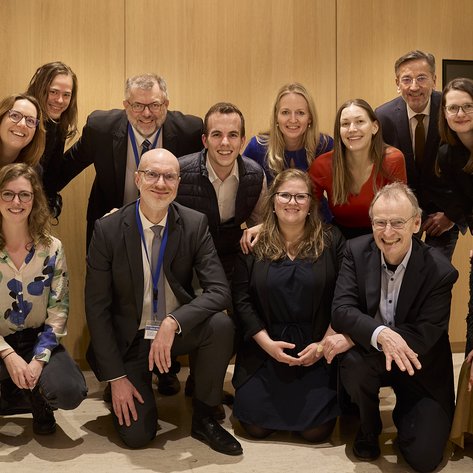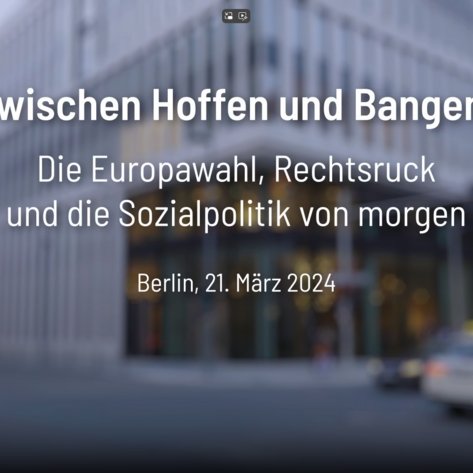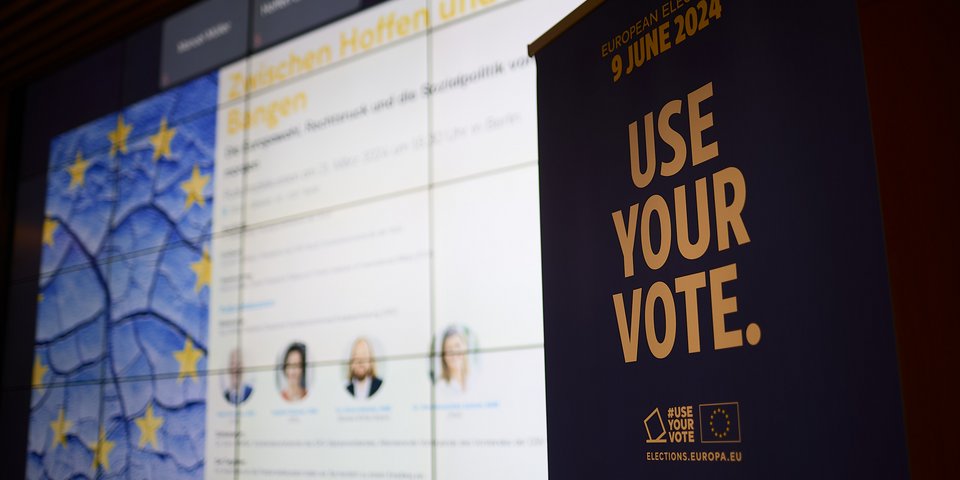 Jan Pauls Fotografie
Jan Pauls FotografiePanel discussion on the European elections
Between hope and fear: The European elections, the swing to the right and the social policy of tomorrow
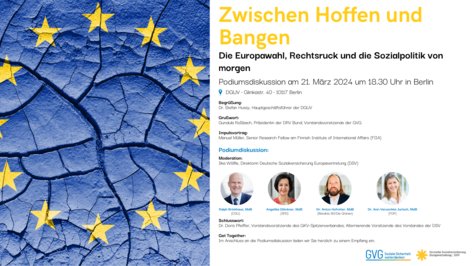
The European
elections are just around the corner: from 6 to 9 June, around 400 million
citizens will have the opportunity to have their say on the future of the
European Union (EU). Together with the Association for Social Security Policy and Research (GVG),
the DSV took this as an opportunity to hold a panel discussion on 21 March
entitled "Between hope and fear – the European elections, the shift to the
right and the social policy of tomorrow". Around 100 participants accepted
the invitation to take a joint look at the future of Europe at the premises of
the German Social Accident Insurance (DGUV) in Berlin.
Political forces
are shifting throughout Europe. A similar situation is expected in the European
elections. Current polls predict gains for populist and anti-democratic
parties; in particular, right-wing populist parties could gain seats. In
Germany, too, many politicians from various political camps are therefore
expressing concern.
Against this
backdrop, Ralph Brinkhaus (CDU), Angelika Glöckner (SPD), Dr Anton Hofreiter
(Bündnis 90/Die Grünen) and Dr Ann-Veruschka Jurisch (FDP), members of the
German Bundestag's EU Committee, discussed the upcoming European elections. The
discussion, moderated by Ilka Wölfle, Director of the DSV European
Representation, centred on the reasons why anti-European and populist parties
are gaining strength across Europe, how the shift to the right can be countered
and how the election could affect European social policy.
There is a lot at stake in the European elections
In his welcome
address, Dr Stefan Hussy, Managing Director of the German Social Accident
Insurance, recalled the motto of the EU, "United in diversity".
Diversity can also be a challenge, which is why he sees the motto as a lasting
mission for everyone. Against this backdrop, social interaction must be
characterised by openness, tolerance, respect and non-violence. Gundula
Roßbach, President of the German Pension Insurance Association, added that it
was important to develop joint strategies and find answers as to how people can
once again be inspired by the European idea. She believes that social insurance
in Germany also has a responsibility here.
What are the chances for a policy of the democratic centre?
In
his keynote speech, Manuel Müller, Senior Researcher at the Finnish Institute
for International Affairs (FIIA) in Helsinki, focussed on the predicted outcome
of the European elections and the resulting changes in the balance of power in
the European Parliament. According to the latest polls, the Social Democratic
S&D group and the group of the European People's Party (EPP) remained
largely stable. In contrast, the far-right groups of the European Conservatives
and Reformists (ECR) and Identity and Democracy (ID) are expected to make
significant gains. In Germany, the AfD belongs to the latter.
Agreement on key issues among the parties represented
The panel
discussion between the members of the German Bundestag showed: even if the four
parties do not always agree on all issues, there was agreement on key issues.
This applied, among other things, to the great importance attached to the EU
and the European elections. Every vote cast in favour of common European values
is a vote for justice, prosperity and the future viability of European
societies. "One thing is beyond question: despite all the difficulties,
the EU is a successful project that we must preserve for the future," said
Ralph Brinkhaus.
Ideas for
bringing the EU closer to its citizens were also discussed and constructive
suggestions for improvement were made. Dr Ann-Veruschka Jurisch emphasised:
"Europe needs more pragmatism and less bureaucracy as we already have
enough of that. The election is an opportunity for us Europeans to give
freedom, the rule of law and democracy in the EU a new lease of life."
The Members of the
Bundestag were generally optimistic about the European elections despite the
expected shift in power. Although anti-European forces are likely to gain
ground, a stable, resilient majority of the democratic and pro-European centre
is nonetheless emerging. This is a strength, in contrast to the USA, for
example, where this centre no longer holds. Accordingly, good politics is still
possible in the EU as long as the European-minded majority finds compromises
and works together. This applies, among other things, to climate protection, to
which all parties represented on the podium have committed themselves. There
are only differences in the choice of ways and means.
In addition to
the expected shift to the right, the future of European social policy was a key
topic. In today's conflict-ridden times, social policy measures and
corresponding expenditure are often portrayed as being in conflict with
expenses to support the economy. Angelika Glöckner emphasised that this
either-or approach was not expedient: "In Europe, we must always jointly
think about economic success and people's social security. This promotes
cohesion and makes us strong enough to overcome the current challenges
together." The panellists agreed that the same applies to the area of
defence. An important aspect in this context is disinformation campaigns and
propaganda, especially from the Russian side, which are exerting a strong
influence in Germany in favour of the AfD and the Sahra Wagenknecht Alliance
(BSW). Defence must be reconciled with social measures, as external defence and
security are the prerequisites for social peace within. However, there were
differences of opinion regarding the way in which the diverse investment
requirements should be dealt with, whether they should be better prioritised or
whether the debt brake should be reformed.
When it came to
the further development and possible need for reform of the EU, the Members of
the Bundestag were unanimous in their opinion that EU enlargement was
challenging, but that it also had geopolitical relevance. In order to maintain
the EU's ability to act even with more Member States, a reform is necessary. For
example, decisions should increasingly be made by qualified majority instead of
unanimity in the Council. Creative solutions for enlargement were also
discussed in this context, such as full membership, which would be agreed but
would only take effect once the EU has been reformed accordingly and the
conditions for more members have been created. Other reform ideas in the
context of a common foreign and security policy were also discussed, including
the idea of a Commissioner for Defence and strengthening the European
Parliament through a comprehensive right of initiative. Dr Anton Hofreiter
emphasised accordingly: "A strong European Parliament is needed for
democracy and the rule of law in Europe."
Do good and talk about it
In her closing
remarks, Dr Doris Pfeiffer, Chairwoman of the Board of the National Association
of Statutory Health Insurance Funds, emphasised that European unification had
become part of people's everyday lives. They study, work or live temporarily or
permanently in another EU country and can rely on good social security and
healthcare due to European integration. However, self-criticism is needed: Many
things that are taken for granted today are achievements of Europe, but this is
no longer recognised. She therefore argued in favour of communicating the
successes of European cooperation more, and above all in understandable terms,
in line with the old adage "Do good and talk about it".
Conclusion: A hopeful look at the future of Europe
Whilst there was
an awareness of the shared political responsibility, there were some
controversial discussions on the podium about specific political issues, such
as compliance with the debt brake or a firewall to the far right at European
level. Overall, it was clear: There is a lot at stake in the 2024 election
year. Progress that has been built up over decades could be called into
question in the wake of increasingly Eurosceptic rhetoric. The fact that many
citizens are concerned about these issues was demonstrated not least by the
great interest in the event.
Nonetheless,
with a view to the European elections, it became evident that hope takes
precedence over fear – in all likelihood, there will continue to be a stable
majority of pro-European parties in the European Parliament in the future, so
that progressive policies remain possible together.
The European
Representation of the German Social Insurance has been involved the joint
shaping of Europe’s social and health dimension for over 30 years. It will
continue to campaign for a strong, democratic and social Europe in the future.
We would like to
take this opportunity to thank all contributors for their valuable input and
all participants for their interest and participation!

